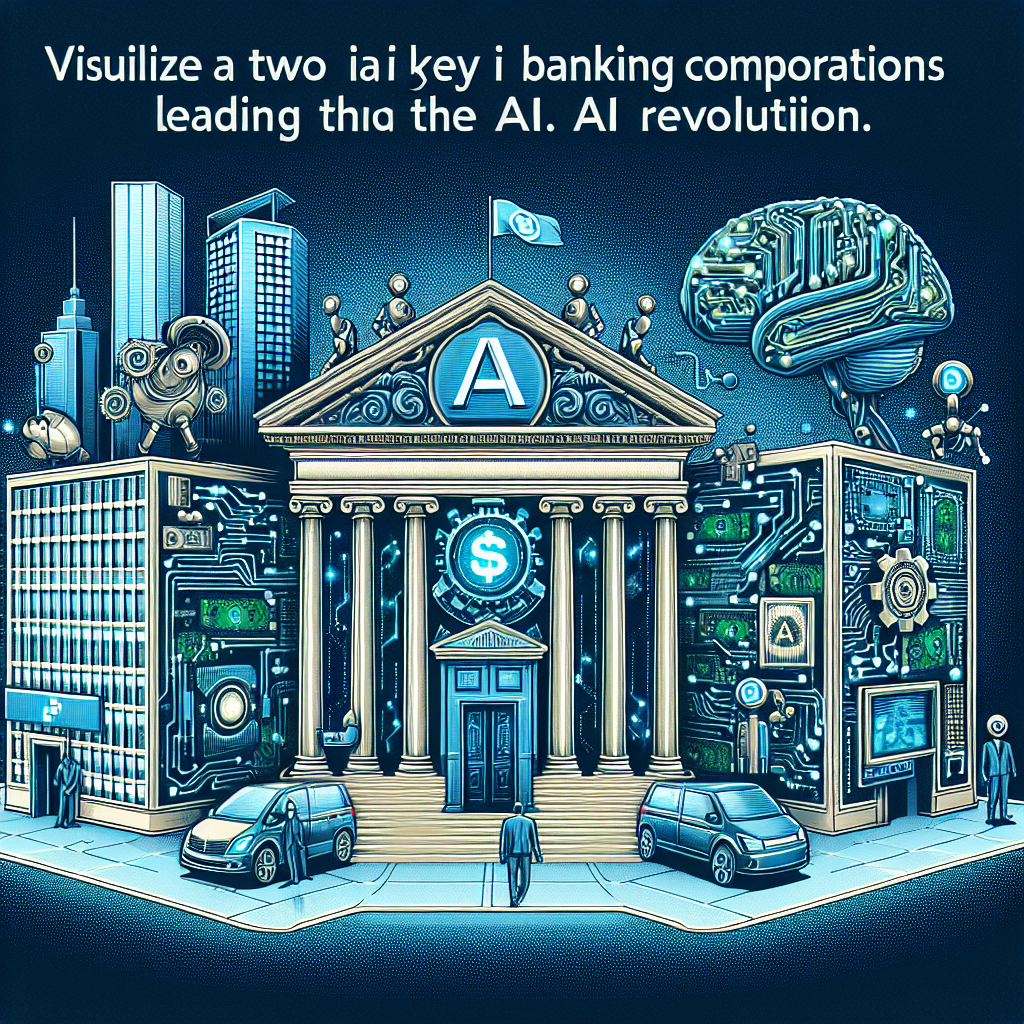“Invest in Tomorrow: Leading Bank Stocks Powering the AI Revolution Today”
Introduction
The integration of artificial intelligence (AI) into the financial sector is reshaping the landscape of banking, with certain institutions leading the charge. Among these, two bank stocks stand out as pivotal players in driving the AI revolution. These banks are not only leveraging AI to enhance operational efficiency and customer experience but are also setting benchmarks for innovation in the industry. By investing in cutting-edge technologies and fostering a culture of digital transformation, these banks are redefining traditional banking paradigms and positioning themselves at the forefront of the AI-driven future. Their strategic initiatives and robust AI adoption are not only transforming their internal processes but are also influencing the broader financial ecosystem, making them top contenders in the realm of AI-powered banking.
Understanding The Role Of AI In Modern Banking
In recent years, the banking sector has witnessed a transformative shift, largely driven by the integration of artificial intelligence (AI) technologies. This evolution is not merely a trend but a fundamental change in how banks operate, interact with customers, and manage risks. As AI continues to reshape the financial landscape, two bank stocks have emerged as frontrunners in this revolution, demonstrating how the strategic implementation of AI can lead to significant advancements in efficiency, customer service, and profitability.
Firstly, JPMorgan Chase stands out as a leader in leveraging AI to enhance its operations. The bank has invested heavily in AI-driven technologies to streamline processes and improve customer experiences. For instance, JPMorgan Chase utilizes AI algorithms to analyze vast amounts of data, enabling the bank to offer personalized financial advice and products tailored to individual customer needs. This not only enhances customer satisfaction but also fosters loyalty, as clients feel understood and valued. Moreover, AI plays a crucial role in risk management for JPMorgan Chase. By employing machine learning models, the bank can predict potential risks and fraudulent activities with greater accuracy, thereby safeguarding its assets and maintaining trust with its stakeholders.
Transitioning to another key player, Bank of America has also made significant strides in integrating AI into its operations. The bank’s virtual assistant, Erica, exemplifies how AI can revolutionize customer service. Erica uses natural language processing and machine learning to assist customers with a wide range of banking tasks, from checking account balances to providing insights into spending habits. This AI-driven tool not only enhances the customer experience by offering 24/7 assistance but also reduces operational costs by minimizing the need for human intervention in routine inquiries. Furthermore, Bank of America employs AI to optimize its investment strategies. By analyzing market trends and historical data, AI systems can identify lucrative investment opportunities and provide data-driven recommendations, thereby enhancing the bank’s competitive edge in the financial markets.
As these examples illustrate, the role of AI in modern banking extends beyond mere automation. It encompasses a comprehensive approach to improving operational efficiency, enhancing customer engagement, and driving innovation. The integration of AI allows banks to process and analyze data at unprecedented speeds, leading to more informed decision-making and strategic planning. Additionally, AI’s ability to learn and adapt over time ensures that banks can continuously refine their processes and offerings, staying ahead of market trends and customer expectations.
Moreover, the adoption of AI in banking is not without its challenges. Issues such as data privacy, ethical considerations, and the need for regulatory compliance must be carefully navigated. However, the potential benefits of AI far outweigh these challenges, as evidenced by the success of JPMorgan Chase and Bank of America. These banks have demonstrated that with the right investments and strategic implementation, AI can be a powerful tool for driving growth and innovation in the banking sector.
In conclusion, the AI revolution in banking is well underway, with JPMorgan Chase and Bank of America leading the charge. Their successful integration of AI technologies highlights the transformative potential of AI in enhancing operational efficiency, improving customer service, and driving profitability. As the banking industry continues to evolve, the role of AI will undoubtedly become even more integral, shaping the future of financial services and setting new standards for excellence and innovation.
How AI Is Transforming Financial Services
Artificial intelligence (AI) is rapidly transforming the financial services industry, offering unprecedented opportunities for innovation and efficiency. Among the various sectors within finance, banking has emerged as a key beneficiary of AI technologies. This transformation is not only reshaping how banks operate but also influencing investment strategies, with certain bank stocks standing out as leaders in the AI revolution. Two such stocks are JPMorgan Chase and Bank of America, both of which are leveraging AI to enhance their services and streamline operations.
JPMorgan Chase, a global financial services powerhouse, has been at the forefront of integrating AI into its operations. The bank has invested heavily in AI-driven technologies to improve customer service, risk management, and fraud detection. For instance, JPMorgan Chase has developed an AI-powered virtual assistant that helps customers with routine banking inquiries, thereby reducing wait times and improving customer satisfaction. Moreover, the bank utilizes machine learning algorithms to analyze vast amounts of data, enabling it to identify potential risks and fraudulent activities more effectively. This proactive approach not only safeguards the bank’s assets but also enhances its reputation as a secure and reliable financial institution.
In addition to customer service and security, JPMorgan Chase is also using AI to optimize its trading strategies. By analyzing market trends and historical data, AI algorithms can predict market movements with greater accuracy, allowing the bank to make more informed investment decisions. This capability not only boosts the bank’s profitability but also provides a competitive edge in the fast-paced world of finance. As a result, JPMorgan Chase has become a top choice for investors seeking exposure to AI-driven growth in the banking sector.
Similarly, Bank of America is making significant strides in harnessing AI to transform its operations. The bank’s AI initiatives are centered around enhancing customer experience and operational efficiency. One of the most notable examples is Erica, Bank of America’s AI-driven virtual financial assistant. Erica helps customers manage their finances by providing personalized insights and recommendations, making banking more accessible and convenient. This innovation has been well-received by customers, leading to increased engagement and satisfaction.
Furthermore, Bank of America is leveraging AI to streamline its internal processes. By automating routine tasks and analyzing data more efficiently, the bank can reduce operational costs and improve productivity. This focus on efficiency not only strengthens the bank’s financial performance but also positions it as a leader in the adoption of cutting-edge technologies. Consequently, Bank of America has become an attractive option for investors looking to capitalize on the AI revolution in banking.
In conclusion, the integration of AI into banking is revolutionizing the financial services industry, with JPMorgan Chase and Bank of America leading the charge. These banks are utilizing AI to enhance customer service, improve risk management, and optimize trading strategies, thereby driving growth and innovation. As AI continues to evolve, its impact on banking is expected to deepen, offering new opportunities for both banks and investors. For those seeking to invest in the future of finance, these two bank stocks represent a promising avenue for growth, underscoring the transformative power of AI in reshaping the financial landscape.
The Impact Of AI On Bank Stock Valuations
The integration of artificial intelligence (AI) into the banking sector has been a transformative force, reshaping the landscape of financial services and significantly impacting bank stock valuations. As AI continues to evolve, it is becoming increasingly clear that certain banks are leveraging this technology more effectively than others, leading to notable shifts in their market positions. Among the myriad of financial institutions, two bank stocks stand out as leaders in driving the AI revolution: JPMorgan Chase and Bank of America. These banks have not only embraced AI to enhance their operational efficiencies but have also strategically positioned themselves to capitalize on the burgeoning opportunities that AI presents.
JPMorgan Chase, a stalwart in the banking industry, has been at the forefront of AI adoption. The bank’s commitment to integrating AI into its operations is evident in its substantial investments in technology and innovation. By deploying AI-driven algorithms, JPMorgan Chase has revolutionized its trading operations, enabling more accurate market predictions and risk assessments. This technological edge has allowed the bank to optimize its trading strategies, resulting in improved profitability and, consequently, a positive impact on its stock valuation. Furthermore, JPMorgan Chase has utilized AI to enhance customer service through the development of sophisticated chatbots and virtual assistants, which streamline customer interactions and improve satisfaction. This focus on customer-centric AI applications not only strengthens client relationships but also bolsters the bank’s reputation as a leader in technological innovation.
Similarly, Bank of America has emerged as a key player in the AI revolution within the banking sector. The bank’s strategic approach to AI is exemplified by its development of Erica, a virtual financial assistant that leverages AI to provide personalized financial guidance to customers. Erica’s success has been instrumental in enhancing customer engagement and loyalty, which are critical factors in driving the bank’s stock performance. Moreover, Bank of America has harnessed AI to bolster its cybersecurity measures, employing machine learning algorithms to detect and mitigate potential threats in real-time. This proactive stance on security not only protects the bank’s assets but also instills confidence among investors, thereby positively influencing its stock valuation.
The impact of AI on these banks’ stock valuations is further underscored by the broader market trends favoring technology-driven financial solutions. As investors increasingly recognize the value of AI in driving operational efficiencies and enhancing customer experiences, banks that are at the forefront of AI adoption are likely to see a corresponding rise in their stock prices. This trend is particularly pronounced in the case of JPMorgan Chase and Bank of America, whose strategic investments in AI have positioned them as leaders in the industry. Consequently, their stock valuations have benefited from a premium associated with their technological prowess and forward-thinking strategies.
In conclusion, the AI revolution is reshaping the banking sector, with significant implications for bank stock valuations. JPMorgan Chase and Bank of America exemplify how strategic investments in AI can drive operational efficiencies, enhance customer experiences, and ultimately lead to improved stock performance. As AI continues to evolve and its applications in banking become more sophisticated, these banks are well-positioned to maintain their leadership roles and capitalize on the opportunities that this technological revolution presents. Investors seeking to benefit from the AI-driven transformation of the banking industry would do well to consider the potential of these top bank stocks, which are at the forefront of harnessing AI to drive growth and innovation.
Key Innovations In AI By Leading Banks

In recent years, the financial sector has witnessed a transformative shift, largely driven by the integration of artificial intelligence (AI) technologies. Among the myriad of financial institutions embracing this change, two banks stand out for their pioneering efforts in leveraging AI to revolutionize their operations: JPMorgan Chase and Bank of America. These institutions have not only adopted AI to enhance their internal processes but have also set benchmarks for the industry, showcasing the potential of AI in banking.
JPMorgan Chase, a global leader in financial services, has been at the forefront of AI innovation. The bank has invested heavily in AI to streamline its operations, improve customer service, and enhance risk management. One of the key innovations by JPMorgan Chase is the development of COiN, or Contract Intelligence, a program that uses machine learning to review legal documents. This AI-driven tool has significantly reduced the time required to review documents, from thousands of hours to mere seconds, thereby increasing efficiency and reducing operational costs. Furthermore, JPMorgan Chase has implemented AI algorithms to detect fraudulent activities, ensuring enhanced security for its customers. By analyzing vast amounts of transaction data in real-time, these algorithms can identify unusual patterns and flag potential fraud, thereby safeguarding customer assets.
Transitioning to another leader in the AI revolution, Bank of America has also made significant strides in integrating AI into its operations. The bank’s most notable innovation is Erica, a virtual financial assistant powered by AI. Erica provides customers with personalized financial advice, helping them manage their finances more effectively. By analyzing customer data, Erica can offer insights into spending habits, suggest ways to save money, and even alert customers to potential issues with their accounts. This level of personalized service not only enhances customer satisfaction but also strengthens customer loyalty. Additionally, Bank of America has utilized AI to optimize its trading strategies. By employing machine learning algorithms, the bank can analyze market trends and make data-driven decisions, thereby improving the accuracy and profitability of its trades.
Moreover, both JPMorgan Chase and Bank of America have recognized the importance of AI in enhancing customer experience. By utilizing AI-driven chatbots and virtual assistants, these banks have been able to provide 24/7 customer support, addressing queries and resolving issues promptly. This not only improves customer satisfaction but also allows human employees to focus on more complex tasks, thereby increasing overall productivity.
In conclusion, the integration of AI by leading banks such as JPMorgan Chase and Bank of America has set a new standard for the financial industry. Their innovative use of AI technologies has not only improved operational efficiency and customer service but has also demonstrated the potential of AI to transform the banking sector. As these banks continue to invest in AI, they are likely to drive further advancements, paving the way for a more efficient, secure, and customer-centric banking experience. The success of these institutions serves as a testament to the transformative power of AI, inspiring other banks to follow suit and embrace the AI revolution.
Future Prospects For AI-Driven Bank Stocks
As the financial sector continues to evolve, the integration of artificial intelligence (AI) has emerged as a pivotal force driving innovation and efficiency. Among the myriad of financial institutions embracing this technological revolution, two bank stocks stand out for their significant contributions and promising future prospects: JPMorgan Chase and Bank of America. These institutions are not only leveraging AI to enhance their operations but are also setting benchmarks for the industry, making them attractive options for investors looking to capitalize on the AI-driven transformation of banking.
JPMorgan Chase, a leader in the financial services industry, has been at the forefront of adopting AI technologies to streamline its operations and improve customer experiences. The bank has invested heavily in AI research and development, focusing on areas such as fraud detection, risk management, and personalized customer service. By utilizing machine learning algorithms, JPMorgan Chase has enhanced its ability to detect fraudulent activities in real-time, thereby safeguarding its assets and those of its clients. Furthermore, the bank’s AI-driven risk management systems have enabled it to make more informed decisions, reducing potential losses and increasing profitability. As a result, JPMorgan Chase is well-positioned to maintain its competitive edge in the rapidly changing financial landscape.
In addition to operational efficiencies, JPMorgan Chase is also exploring AI’s potential to revolutionize customer interactions. The bank has developed sophisticated chatbots and virtual assistants that provide personalized financial advice and support, enhancing customer satisfaction and loyalty. These AI-driven tools not only improve the customer experience but also reduce operational costs, as they can handle a significant volume of inquiries without human intervention. Consequently, JPMorgan Chase’s strategic focus on AI positions it as a formidable player in the banking sector, with promising prospects for future growth.
Similarly, Bank of America has made significant strides in integrating AI into its operations, recognizing the transformative potential of this technology. The bank’s AI initiatives are centered around improving customer service, optimizing internal processes, and enhancing data analytics capabilities. One of Bank of America’s most notable AI-driven innovations is Erica, a virtual financial assistant that helps customers manage their finances more effectively. Erica leverages natural language processing and machine learning to provide personalized insights and recommendations, making banking more accessible and convenient for users. This focus on customer-centric AI solutions has not only strengthened Bank of America’s brand but also contributed to its robust financial performance.
Moreover, Bank of America is utilizing AI to optimize its internal processes, thereby increasing efficiency and reducing costs. By automating routine tasks and analyzing vast amounts of data, the bank can identify trends and opportunities that were previously difficult to discern. This data-driven approach enables Bank of America to make strategic decisions with greater precision, ultimately enhancing its competitive position in the market. As AI continues to evolve, Bank of America is well-equipped to harness its potential, ensuring sustained growth and profitability.
In conclusion, the future prospects for AI-driven bank stocks like JPMorgan Chase and Bank of America are undeniably promising. These institutions are not only leveraging AI to enhance their operational efficiencies and customer experiences but are also setting new standards for the industry. As AI technology continues to advance, these banks are poised to capitalize on its transformative potential, making them attractive investments for those seeking to benefit from the ongoing AI revolution in the financial sector.
Comparing AI Strategies Of Top Bank Stocks
In the rapidly evolving landscape of financial technology, artificial intelligence (AI) has emerged as a transformative force, reshaping the operations and strategies of banks worldwide. Among the myriad of financial institutions embracing this technological revolution, two bank stocks stand out for their innovative AI strategies: JPMorgan Chase and Bank of America. These banking giants are not only leveraging AI to enhance their operational efficiency but are also setting benchmarks for the industry, driving the AI revolution forward.
JPMorgan Chase, a leader in the financial sector, has been at the forefront of integrating AI into its business model. The bank’s AI strategy is multifaceted, focusing on improving customer experience, optimizing internal processes, and enhancing risk management. One of the most notable implementations of AI at JPMorgan Chase is its COiN (Contract Intelligence) platform. This AI-powered system is designed to analyze legal documents and extract critical data points, significantly reducing the time and effort required for document review. By automating this labor-intensive process, JPMorgan Chase not only increases efficiency but also minimizes the risk of human error, thereby enhancing the accuracy of its operations.
Moreover, JPMorgan Chase has been utilizing AI to personalize customer interactions. Through advanced data analytics and machine learning algorithms, the bank can offer tailored financial advice and product recommendations to its clients. This personalized approach not only improves customer satisfaction but also strengthens client relationships, providing a competitive edge in the crowded banking sector. Furthermore, the bank’s commitment to AI-driven innovation is evident in its substantial investments in technology and talent, ensuring that it remains a leader in the AI revolution.
On the other hand, Bank of America has also made significant strides in harnessing the power of AI to transform its services. The bank’s AI strategy is centered around its virtual financial assistant, Erica. Launched in 2018, Erica has quickly become a cornerstone of Bank of America’s digital banking experience. This AI-driven assistant provides customers with a seamless and intuitive way to manage their finances, offering insights into spending habits, bill reminders, and even proactive fraud alerts. By integrating Erica into its mobile banking platform, Bank of America has enhanced its customer engagement, making banking more accessible and convenient for its clients.
In addition to improving customer service, Bank of America is leveraging AI to bolster its cybersecurity measures. The bank employs machine learning algorithms to detect and respond to potential security threats in real-time, safeguarding its clients’ sensitive information. This proactive approach to cybersecurity not only protects the bank’s reputation but also instills confidence in its customers, reinforcing their trust in the institution.
In comparing the AI strategies of these two banking titans, it is evident that both JPMorgan Chase and Bank of America are committed to driving the AI revolution in the financial sector. While JPMorgan Chase focuses on enhancing operational efficiency and personalizing customer interactions, Bank of America emphasizes improving customer service through its virtual assistant and strengthening cybersecurity. Despite their differing approaches, both banks are leveraging AI to create value for their stakeholders and maintain their competitive advantage in the industry.
In conclusion, as the AI revolution continues to unfold, JPMorgan Chase and Bank of America are leading the charge, setting new standards for innovation and excellence in the banking sector. Their strategic investments in AI not only position them as top contenders in the market but also pave the way for future advancements in financial technology. As other banks look to emulate their success, the AI strategies of these two institutions will undoubtedly serve as a blueprint for the industry’s continued evolution.
Investment Opportunities In AI-Focused Banks
In recent years, the financial sector has witnessed a transformative shift driven by the integration of artificial intelligence (AI) technologies. Among the various players in this space, certain banks have emerged as frontrunners in leveraging AI to enhance their operations, customer experiences, and overall efficiency. As investors seek opportunities in this burgeoning field, two bank stocks stand out for their pioneering efforts in the AI revolution: JPMorgan Chase and Bank of America. These institutions have not only embraced AI but have also strategically positioned themselves to capitalize on its potential, making them attractive prospects for those looking to invest in AI-focused banks.
JPMorgan Chase, a global financial services leader, has been at the forefront of AI adoption within the banking industry. The bank has invested heavily in AI-driven technologies to streamline its operations and improve decision-making processes. For instance, JPMorgan Chase has developed an AI-powered program called COiN (Contract Intelligence), which automates the review of legal documents and significantly reduces the time and cost associated with this traditionally labor-intensive task. By employing machine learning algorithms, COiN can analyze thousands of documents in seconds, thereby enhancing the bank’s operational efficiency. Furthermore, JPMorgan Chase has utilized AI to bolster its fraud detection capabilities. By analyzing vast amounts of transaction data, the bank’s AI systems can identify unusual patterns and flag potential fraudulent activities in real-time, thus safeguarding both the institution and its customers.
Transitioning to another key player, Bank of America has also made significant strides in integrating AI into its operations. The bank’s virtual assistant, Erica, exemplifies its commitment to enhancing customer experience through AI. Erica leverages natural language processing and machine learning to provide customers with personalized financial advice, assist with transactions, and answer queries. This AI-driven tool not only improves customer satisfaction but also reduces the workload on human customer service representatives, allowing them to focus on more complex tasks. Additionally, Bank of America has implemented AI in its investment management services. By analyzing market trends and customer data, AI algorithms can offer tailored investment recommendations, thereby optimizing portfolio performance for clients.
Moreover, both JPMorgan Chase and Bank of America have recognized the importance of AI in risk management. By employing predictive analytics, these banks can assess potential risks more accurately and make informed decisions to mitigate them. This proactive approach not only strengthens their financial stability but also enhances investor confidence. As AI continues to evolve, these banks are well-positioned to adapt and innovate, ensuring they remain competitive in an increasingly digital landscape.
In conclusion, the integration of AI technologies within the banking sector presents a compelling investment opportunity. JPMorgan Chase and Bank of America have demonstrated their commitment to harnessing the power of AI to drive efficiency, enhance customer experiences, and manage risks effectively. As these banks continue to innovate and expand their AI capabilities, they offer promising prospects for investors seeking to capitalize on the AI revolution in the financial industry. By investing in these forward-thinking institutions, investors can potentially benefit from the transformative impact of AI on the banking sector, making JPMorgan Chase and Bank of America top contenders in the realm of AI-focused bank stocks.
Q&A
1. **Question:** What are the top two bank stocks driving the AI revolution?
**Answer:** JPMorgan Chase and Bank of America are the top two bank stocks driving the AI revolution.
2. **Question:** How is JPMorgan Chase utilizing AI in its operations?
**Answer:** JPMorgan Chase is utilizing AI for fraud detection, customer service chatbots, and algorithmic trading to enhance efficiency and customer experience.
3. **Question:** What specific AI technology is Bank of America known for implementing?
**Answer:** Bank of America is known for implementing its AI-driven virtual assistant, Erica, which helps customers with financial transactions and inquiries.
4. **Question:** How does AI contribute to risk management in these banks?
**Answer:** AI contributes to risk management by analyzing large datasets to identify potential risks and anomalies, thus enabling proactive measures to mitigate financial threats.
5. **Question:** What impact has AI had on customer service in these banks?
**Answer:** AI has improved customer service by providing 24/7 support through chatbots and virtual assistants, leading to faster response times and personalized customer interactions.
6. **Question:** Are these banks investing in AI research and development?
**Answer:** Yes, both JPMorgan Chase and Bank of America are heavily investing in AI research and development to stay at the forefront of technological advancements in the banking sector.
7. **Question:** What is the future outlook for AI in the banking industry according to these banks?
**Answer:** The future outlook for AI in the banking industry is promising, with expectations of further integration into various banking processes, enhancing efficiency, security, and customer satisfaction.
Conclusion
The top two bank stocks driving the AI revolution are JPMorgan Chase and Bank of America. JPMorgan Chase has been at the forefront of integrating AI into its operations, utilizing machine learning algorithms to enhance trading strategies, improve customer service through AI-driven chatbots, and streamline back-office processes. Their significant investment in AI technology has positioned them as a leader in financial innovation. Similarly, Bank of America has made substantial strides in AI adoption, particularly with its virtual financial assistant, Erica, which leverages AI to provide personalized banking experiences and insights to customers. The bank’s commitment to AI is evident in its efforts to enhance fraud detection, risk management, and operational efficiency. Both banks exemplify how financial institutions can harness AI to drive growth, improve customer engagement, and maintain a competitive edge in the rapidly evolving financial landscape.





